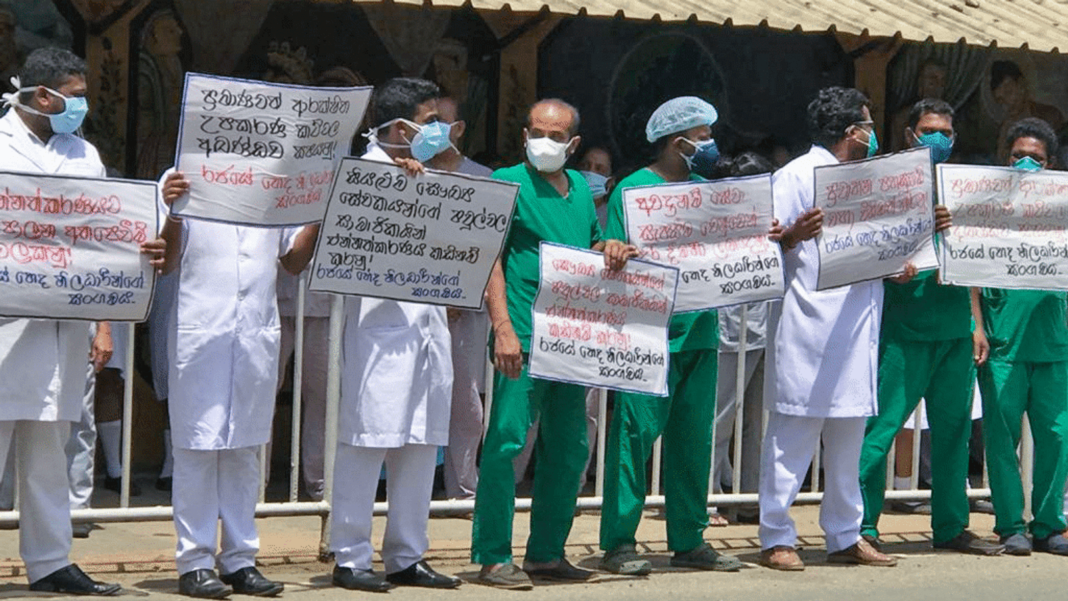Shashika Bandara & Inosha Alwis.
Sri Lanka is facing a severe political and economic crisis, and the health system is at risk of collapse. The crisis has been caused by years of economic mismanagement, an abrupt ban on agrochemicals in April 2021 causing a steep drop in agricultural output, and the Covid-19 induced decline of the tourism industry. In early April 2022, Sri Lanka declared itself insolvent and unable to service its overseas debt.
Interconnected challenges, including a severe shortage of essential medicines, a worsening socioeconomic landscape and human rights violations, remain substantial threats to health. Understanding and addressing the health crisis is an urgent priority, both for its population and for other low and middle income countries facing similar challenges.
During the first quarter of 2022, lengthy power cuts and medicines shortages undermined the provision of effective healthcare across the country. Efforts to resolve these problems have fallen far short of requirements, and over 150 essential drugs remained out of stock as of November 6. Additionally, essential surgical consumables and laboratory items are in short supply, affecting medical, surgical and diagnostic capacities in all hospitals.
Sri Lanka’s health system, traditionally free at the point of care, has been recognised as both low cost and high impact. But increasing out of pocket expenditure and health related inflation of nearly 40% are threatening this legacy. Uncertain power and fuel supplies continue to compound these challenges, interrupting not only service delivery but also disease surveillance and medical supply chains.
A steep rise in poverty and unemployment has harmed population health and reduced access to care. Social determinants of health such as education, food and income continue to be adversely affected, and people on the lowest incomes such as plantation sector workers have been hardest hit. Public health measures to prevent the spread of infectious diseases such as Covid-19 have had to contend with overcrowding on public transport because of fuel shortages.
Nearly six million Sri Lankans – three in every 10 households – are food insecure and face an 80% inflation rate for food. Poor diets and missed meals increase the risk of non-communicable diseases through conditions such as hypertension and dyslipidaemia. The government has recognised food shortages as a key priority in its strategic plans.
UNICEF estimates that over two million children require humanitarian assistance. Depression and deaths by suicide are direct consequences of the crisis, and the mental health of children and young adults is deteriorating. Prevailing human rights conditions that deny freedom of assembly and association also have a big effect on public health. Specifically, citizen protests that highlight shortages of food, medicine and other essentials continue to face violent crackdowns by the state despite warnings from human rights organisations.
Healthcare workers are personally affected by the economic and health crises facing all Sri Lankans. But they also face serious challenges at work where severe shortages of power, medicines and vital equipment put them under immense pressure. Consequently, burnout is common and emigration of healthcare workers has increased. The government facilitates this migration with the short term expectation of earning foreign currency, which is likely to further weaken the health system.
Policy imperatives
The leaders need to improve their policy on health system strengthening in both the short term and the long term. One of the most immediate concerns is a shortage of essential medicines: the current donation based stopgap solutions are not sustainable. The government must support initiatives to increase local production of pharmaceuticals, improve national information systems to include real-time tracking of drug shortages, and establish mechanisms to stabilise power and fuel supply to essential healthcare facilities, including hospitals. It must also urgently rethink its current budgetary policy, including the budget for 2023, which continues to prioritise defence spending over other sectors such as health.
Additionally, the government must make comprehensive, sustainable plans to request and use international development assistance for health targeted towards restoring the supply of essential medicines, supporting healthcare workers and improving delivery of services. Humanitarian support for the food crisis must continue, at least in the short term.
In the longer term, Sri Lanka’s current crisis is an opportunity for the government to prioritise strengthening the health system in critical areas such as primary care, to move mental health up the national agenda and to improve social support for poor and marginalised women and children.
Shashika Bandara is a doctoral candidate in global health policy at McGill University. He is formerly a Policy Associate at the Center for Policy Impact in Global Health at the Duke Global Health Institute.
Inosha Alwis is a physician and a lecturer at the Department of Community Medicine, Faculty of Medicine, University of Peradeniya.
This editorial was originally published in the British Medical Journal on November 29, 2022
